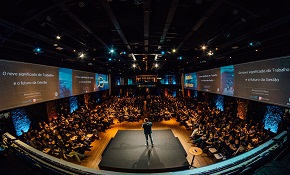28 1 月, 2021
Ecovia food summit asks adopters to ‘pay it forward’
Ecovia Intelligence has hosted its latest edition of The Sustainable Foods Summit, which took place recently in Amsterdam.

The summit explored sustainability in the food industry, including adoption rates of ethical labelling schemes, re-directing food waste, and ‘green’ packaging materials available on the market.
Figures show lunch on-the-go alone creates 11 billion packaging waste items annually in the UK.
Some new plastic alternatives were presented at the summit, such as Agrana creating thermoplastic starch from plant sugars, and Austrian firm VPZ taking
cellulose from wood to make PackNatur, which is used in net packaging.
Clare McKeown, market development manager at compostable and renewable flexible packaging films manufacturer Futamura, set the scene for food plastics by insisting that packaging which is contaminated by food is often not recycled.
She gave examples of brands that have adopted compostable packaging, such as Seed and Bean chocolate, Proper Crisps from New Zealand, Teapigs, Lost Sheep Coffee – many of which is consumed on-the-go, where recycling rates are particularly low and littering is common.
“We do not encourage littering but at events [such as concerts] there is always plastics that ends up on the landscape unfortunately.”
She added that: “Compostables are part of the answer. They offer the ability for our society to continue to reap the benefits of plastics materials while radically reducing their negative impacts.
“But compostables cannot take over the whole plastic industry but they are a perfect fit in those categories where there’s multiple layers, and contaminated with food.”
Some estimates suggest it can cost up to 20p per unit price to switch to compostable packaging, something an audience member said customers would be willing to pay but advised that consumers need more information on-pack to explain how to recycle compostable packaging.
When questioned by the audience about some compostable recycling being sent to landfill, McKeown conceded it was a frustration.
“In the UK there are 55 industrial composting sites but only three actually accept film because they see it as a contaminant. We are lobbing, we are working with governments, it will take time. It is important that our industry maintains its high standards of making independently verified and certified claims of compostability and sustainability – it is easy in the heightened ‘plastic fever’ for companies to greenwash.
“It is also important that our industry has support from the government and waste collection/processing industries in order to facilitate a clear labelling system and an efficient organic waste recycling infrastructure.”
Frankie Gillard, ‘change maker’ at A Plastic Planet, criticised the plastic packaging and recycling sectors, pointing out that while flexible plastic packaging is often labelled as recyclable, it very often is not actually recycled.
“My feeling is for flexible packaging to look at digital packaging and look at it in earth digestable materials.”
She conceded that currently brands have to pay more for more environmentally friendly packaging, but insisted: “You have to pay it forward – you will get long-term customer loyalty.”
Caroline Frery, head of business development at TerraCycle Europe, gave an ambitious message to the industry: “Our aim is to make everything recyclable!”
Terracycle started working with Walkers earlier this year to boost crisp packet recycling, and has so far collected 40m used packets.
She said as with all new packaging concepts or processes, the sector needs to make a business case: “Unless the company does not see the value that can be created, the company won’t make that change.”
Futamura’s McKeown added: “In five years’ time we would expect that compostable films will have found a solid market for those flexible food packaging applications that are too small to mechanically recycle and / or are contaminated by food waste, such as coffee capsules, sandwich skillets, tea sachets, confectionery twistwrap.”
Amarjit Sahota, founder and president, Ecovia Intelligence, said clearly there was lots more work to do in the quest for a more sustainable food packaging sector.
He said the industry needed to continue to address how to move from a linear to a circular system, how to close the packaging loop cycles, and how to move to compostable packaging materials.

